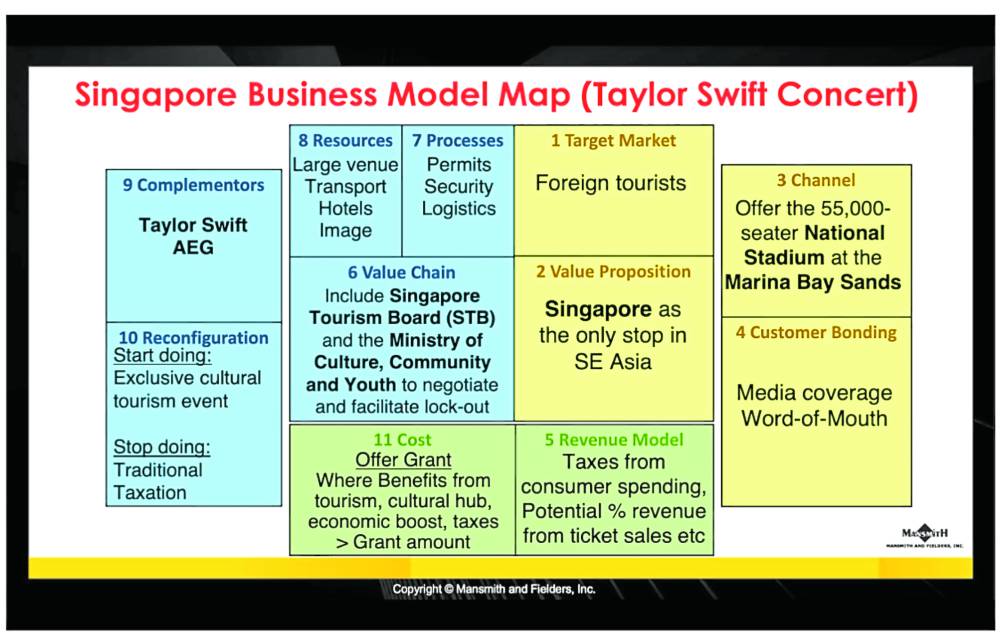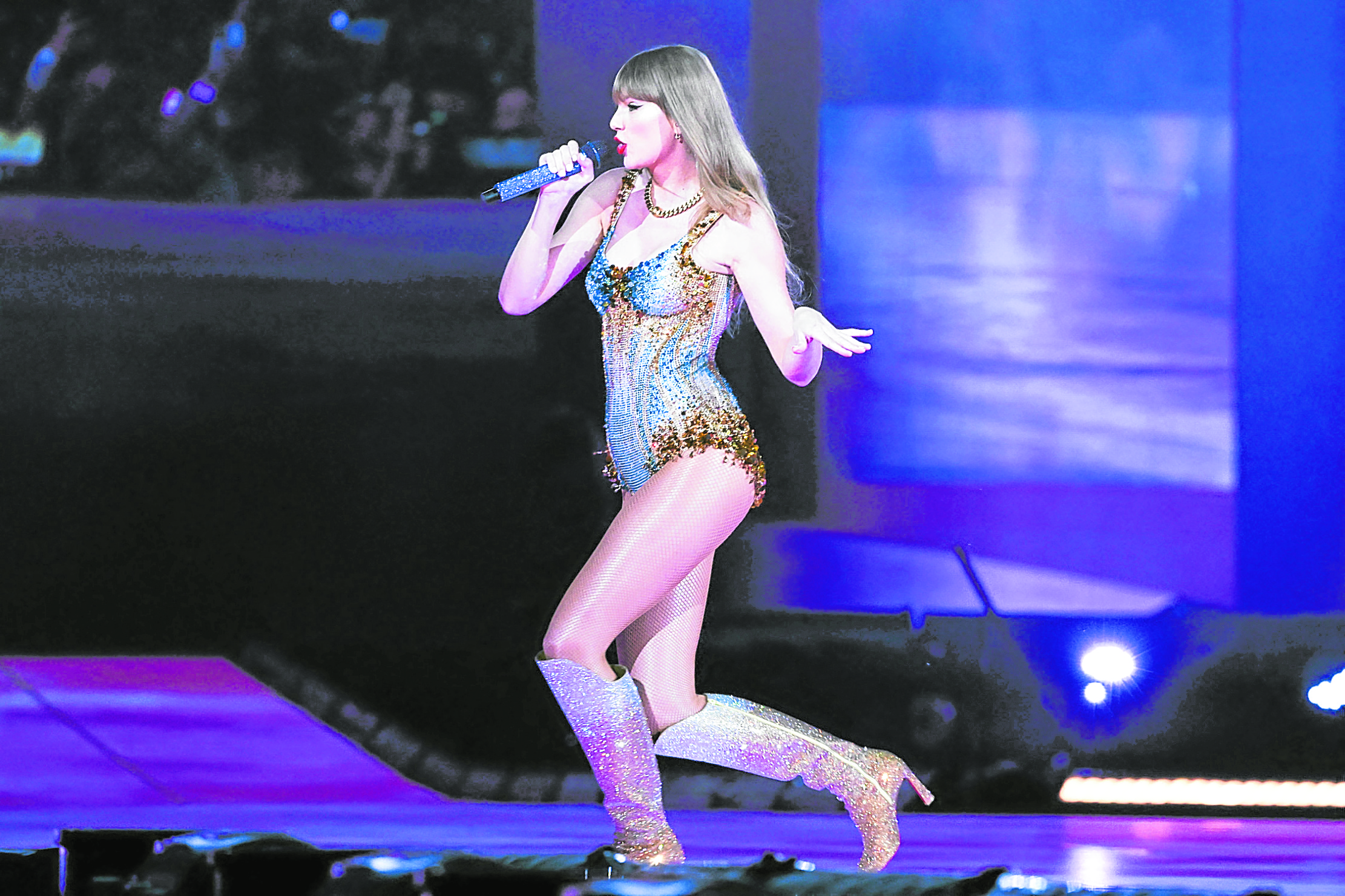Decoding concert economics: Taylor Swift World ‘Eras Tour’

BUSINESSMODEL MAP Singapore bagged an innovative concert deal that benefits the city-state in at least four ways—tourism, cultural image, economic boost and higher tax revenue. —MANSMITH BUSINESS MODEL MAP
Superstar singer-songwriter Taylor Swift, with over half a billion social media followers, launched her highly successful “The Eras Tour” through Anschutz Entertainment Group (AEG), encompassing 152 dates across five continents from March 17, 2023 to Dec. 8, 2024.
Unfortunately, she only visited Singapore in Southeast Asia for six shows this March, bypassing other neighboring countries, much to the dismay of Swifties there. A total of 22 million users had registered to vie for 330,000 tickets made available during the ticket sale in Singapore, which sold out immediately despite website crashes.
It was later shared by Thailand Prime Minister Srettha Thavisin, quoting AEG, that the Singapore government had offered up to $3 million in grant per show to AEG provided they bypass other Southeast Asian countries.
This statement was confirmed by the Singapore Tourism Board, although it denied that the grant was anywhere near the amount being speculated. It did not specify details of any restrictive clause, citing it was purely a commercial goal to convert Singapore into a cultural hub.
READ: Taylor Swift’s Eras Tour allegedly omits PH, other regions after closing exclusive deal with SG
Thavisin added, “If she came to Thailand, it would have been cheaper to organize it here, and I believe she would be able to attract more sponsors and tourists to Thailand. Even though we would have to subsidize at least 500 million baht ($14 million), it would be worth it.”
‘Not so neighborly’
House Rep. Joey Salceda (Albay, second district) called on the Department of Foreign Affairs to press for an explanation from its Singaporean counterpart.
“If true, this isn’t what good neighbors do,” he said, lamenting that such a deal boosted the Singaporean economy at the expense of neighboring countries. “It also runs contrary to the principle of consensus-based relations and solidarity on which the Asean (Association of Southeast Asian Nations) was founded.”
READ: Salceda questions Singapore’s exclusivity of Taylor Swift’s concert
Salceda, however, admitted that the deal paid off, citing figures that hotel and airline bookings had risen by up to 30 percent during the concert period. While encouraging locals to level up the infrastructure, security and related logistics required to host major events, he noted that the exclusive deal had jacked up industry revenues by $60 million.
“So, the grant produced 30 times more in economic activity … Even the full cost would have returned 10 times more in economic activity,” he said.
Speaking to the Inquirer, Salcedo estimates that just getting a third of the tourists that Singapore attracted would have boosted the Philippine economy by P1.44 billion, assuming that it matched the subsidy.

GLOBAL BLOCKBUSTER Taylor Swift performs on stage in Sydney as part of her world “Eras Tour” on Feb. 23. In Southeast Asia, Singapore bagged the exclusive right to stage her concert series. —AFP
Using the expanded business model framework of the Mansmith Business Model Map to decode the Singaporean concert grant, the framework provides a structured approach in analyzing and designing business models, focusing on various key building blocks and their interdependencies.
Let’s look at the first five building blocks, known as the offering model, that can make Singapore desirable with the Taylor Swift deal.
- Target market: Foreign tourists, given the aim to make Singapore a regional cultural hub and top-of-mind tourist destination.
- Value proposition: Exclusive opportunity for Singapore being the only stop for the artist’s concert in Asean.
- Channel: Offering the 55,000-seater National Stadium at Marina Bay Sands, the new prominent visual landmark in Singapore, as an exclusive venue.
- Customer bonding strategy: Generate consumer demand by promoting Singapore through extensive media coverage and word of mouth, encouraging tourists to visit or revisit Singapore.
- Revenue model: Generate government revenue from increased taxes due to higher spending by tourists. Additional revenue could come from a percent of ticket sales, merchandise and sponsorships.
Building blocks
Let’s look at the critical six building blocks of the operating model that will make the offering model of the Taylor Swift deal feasible.
Operating model:
- Value chain: Include the Singapore Tourism Board and the Ministry of Culture, Community and Youth in negotiating and facilitating the concert ahead of other countries.
- Key processes: Offer the advantage of an organized and disciplined government where permits and regulation ease can be guaranteed. Effective security measures are already in place for the safety of the artist, organizers and attendees. Offer assistance for coordinated transportation, accommodation and other logistical aspects for smooth event execution.
- Key resources: Highlight available venues, with accommodation options, transportation facilities, security measures and other logistical support required by the concert organizer.
- Key complementors: Taylor Swift as main attraction will be the tourist crowd drawer; AEG is a partner in international large-scale event organizing.
- Reconfiguration for innovation: (Start doing) Create an exclusive international event to enhance the cultural reputation of Singapore to attract foreign tourists. (Stop doing): Move away from traditional tax revenue model.
- Cost: Offer grant for concert to secure exclusivity in hosting the event, based on earlier data provided in cities where concerts had been hosted. The benefit from economic and cultural stimulation will be more than the grant amount since tourists will spend money on hotels, food and souvenirs.
Based on the Mansmith business model map of Taylor Swift’s Singapore concert, it was an innovative offer made by Singapore that can benefit them in at least four ways—tourism, cultural image, economic boost and higher tax revenue.
If the Philippines or any Southeast Asia were to host a pop icon like Taylor Swift in the future, should it offer a similar grant without asking for exclusivity? Should it first consult its competing neighboring countries in the name of inclusivity? Why or why not? What do you think? —CONTRIBUTED INQ
Josiah Go is chair and chief innovation strategist of Mansmith and Fielders Inc. He is author of the 55-video Business Model Course available at www.continuum-edu.com.
Visit www.marketmastersconference.com to view the agenda of the 15th Mansmith Market Masters Conference on May 8.
